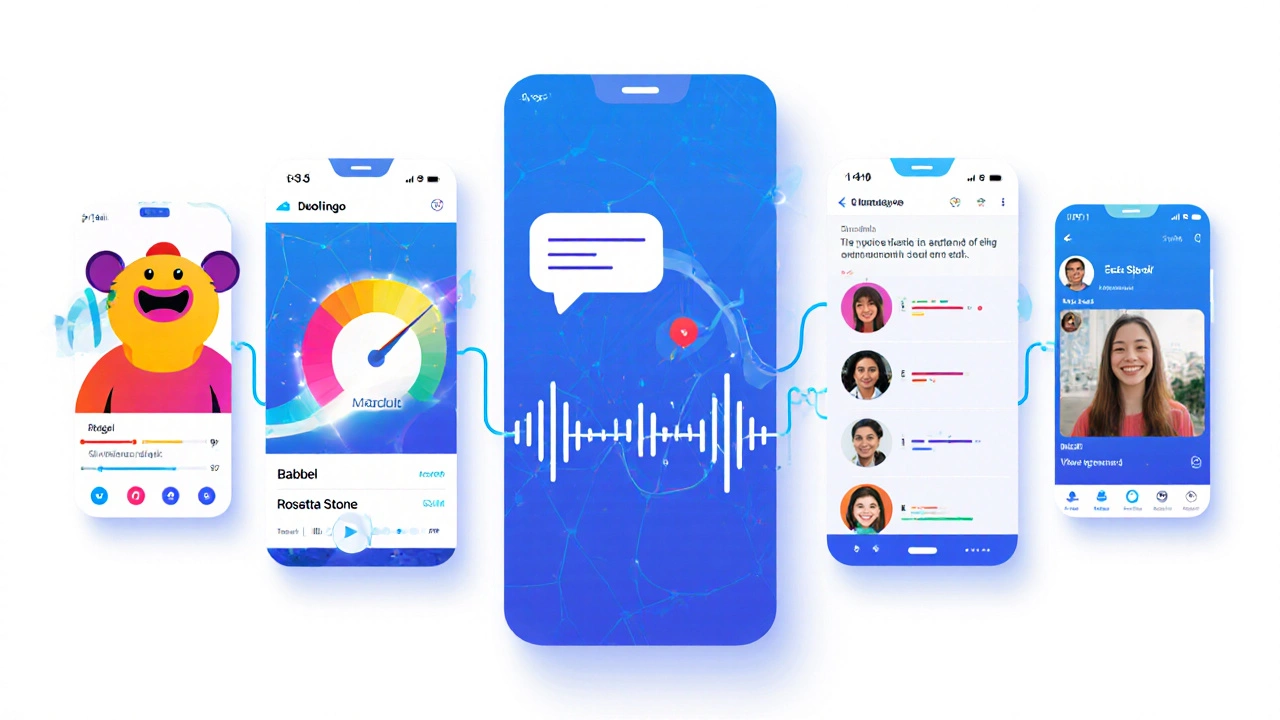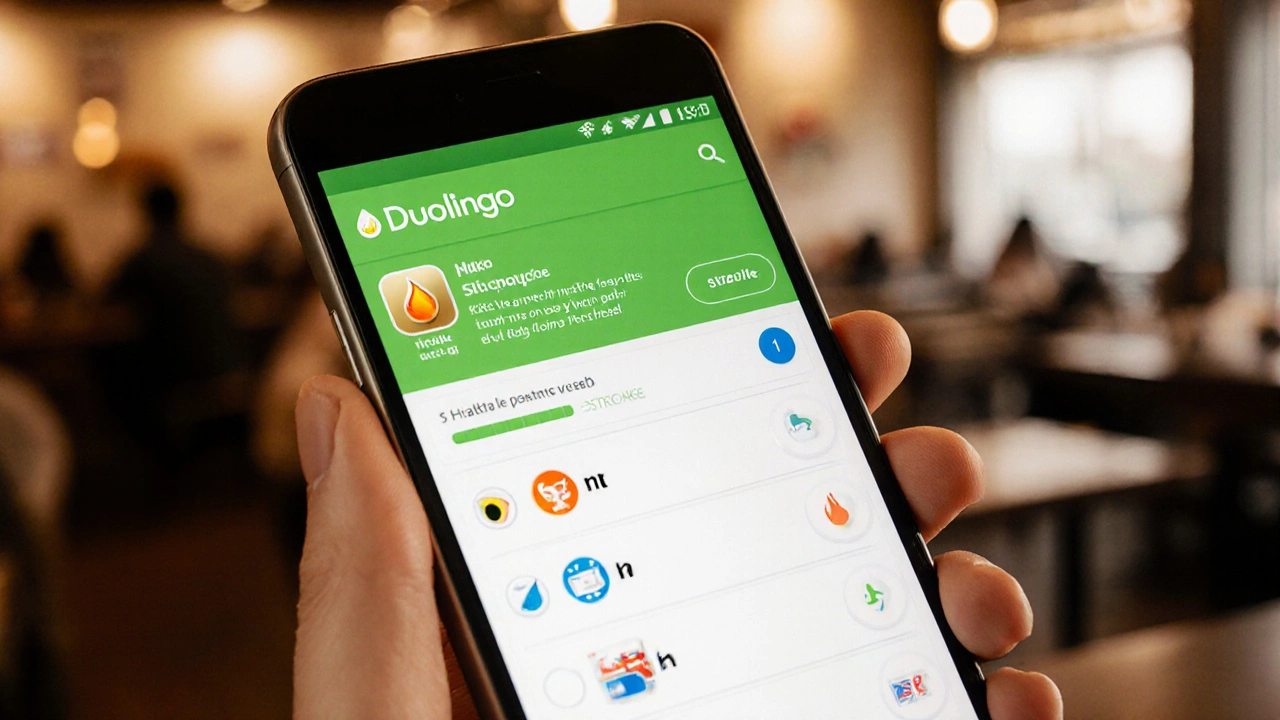English App Recommender
What's your primary goal?
How much time can you spare daily?
How do you feel about subscriptions?
Do you need offline access?
What feedback works best for you?
Your Perfect Match
When you ask yourself best English speaking app, you’re really hunting for a tool that turns hesitant pronunciation into confident conversation. English speaking app is a mobile or web‑based program designed to improve spoken English through interactive exercises, real‑time feedback, and conversation practice. In 2025 the market is crowded, but a handful of apps actually bring measurable progress. Let’s cut through the hype, compare the heavy‑hitters, and give you a clear path to pick the one that matches your schedule, budget, and learning style.
Key Takeaways
- AI‑driven feedback is the single biggest driver of rapid improvement.
- Apps that pair you with native speakers double your speaking time.
- Free tiers are great for starters, but a modest subscription unlocks personalized vocab and offline mode.
- Consistency beats intensity - 10 minutes daily outperforms 2‑hour binge sessions.
- Look for a clear progress dashboard so you can track pronunciation scores over weeks.
How to Choose the Right App
Before we dive into the reviews, ask yourself these five questions. Your answers will narrow the field faster than any Google search.
- What’s your primary goal? Casual travel talk, job interviews, or academic presentations?
- How much time can you spare each day? Some apps need 15‑minute bursts, others expect longer practice blocks.
- Are you comfortable with a subscription? Free versions often lack advanced speech analysis.
- Do you need offline access? If you travel often, this can be a deal‑breaker.
- Do you prefer AI feedback or human conversation? The best apps blend both.
Answering honestly will point you toward the app that feels less like work and more like a daily habit.
Duolingo - Gamified Basics with Speaking Boost
Duolingo is a gamified language platform that offers short speaking drills and instant pronunciation checks. The app’s “Speak” skill asks you to repeat a phrase into the mic; a built‑in model scores clarity on a 0‑100 scale. Duolingo shines for beginners because lessons are bite‑sized and the streak mechanic nudges you to practice daily. The free tier covers most basics, but the Super Duolingo plan (AU$9.99/month) unlocks "Practice Events" where you can join live voice sessions with other learners.
Babbel - Structured Lessons with Real‑World Dialogues
Babbel is a subscription‑only app that arranges content around everyday situations such as ordering coffee or making a reservation. Its speech recognition engine focuses on intonation and rhythm, giving you a “Pronunciation Score” after each dialogue. At AU$12.99/month you get 15‑minute lessons, a built‑in grammar review, and a voice‑coach that repeats your errors back to you. Babbel’s biggest advantage is the cultural notes that help you sound natural, not just correct.
Rosetta Stone - Immersion‑First with TruAccent
Rosetta Stone is a veteran language‑learning brand that relies on total immersion and its proprietary TruAccent AI. TruAccent compares your recording to native‑speaker benchmarks and highlights mismatched phonemes. The app is pricey - AU$119 per year - but the depth of immersion (no translation, all‑English prompts) makes it a favorite for serious speakers who want to think directly in English. Offline mode works on both iOS and Android, so you can practice on flights.

Elsa Speak - AI‑Powered Pronunciation Coach
Elsa Speak is an AI‑driven pronunciation coach that zeroes in on individual sounds. After a quick placement test, Elsa creates a custom plan targeting your weakest phonemes. The feedback includes visual waveforms, mouth‑position videos, and a daily “Scorecard” that shows improvement over time. Plans start at AU$14.99/month, but the free tier still offers a solid 5‑minute daily exercise. Users preparing for IELTS or TOEFL often praise Elsa for its exam‑style drills.
HelloTalk - Language Exchange with Real Humans
HelloTalk is a social language‑exchange app that pairs you with native English speakers who want to learn your language. You can send voice notes, schedule live calls, and get informal corrections from real people. The free version includes unlimited text and voice chat, while a VIP upgrade (AU$6.99/month) removes ad interruptions and adds translation assistance. Because you’re speaking with actual humans, the accent variety is massive - perfect for getting used to different English dialects.
Memrise - Memory‑Based Vocabulary with Speech Tests
Memrise mixes spaced‑repetition flashcards with short speaking quizzes. After you learn a word, the app asks you to pronounce it; a native‑speaker video follows, showing you the correct mouth shape. The premium plan (AU$8.99/month) adds "Learn with locals" videos and offline decks. Memrise works best if you already have a solid vocabulary base and need to cement pronunciation.
Tandem - Community‑Driven Practice
Tandem is a community platform where you can schedule voice or video calls with verified native speakers. The app’s "Language Partner" algorithm matches you based on interests, making conversations feel natural rather than scripted. Tandem’s free tier provides unlimited text chat; a premium upgrade (AU$7.99/month) unlocks unlimited voice minutes and a "pro‑translator" feature that helps you correct each other in real time.

Side‑by‑Side Comparison
| App | AI Pronunciation Score | Human Conversation | Free Tier | Price (AU$/month) | Offline Mode |
|---|---|---|---|---|---|
| Duolingo | Basic | Practice Events (Super) | Yes | 0 / 9.99 (Super) | Yes (Super) |
| Babbel | Moderate | None built‑in | No | 12.99 | Yes |
| Rosetta Stone | High (TruAccent) | None | No | 119 (annual) | Yes |
| Elsa Speak | Very High (phono‑specific) | None | Limited | 14.99 | Yes |
| HelloTalk | Low (no AI) | Native speakers | Yes | 6.99 (VIP) | No |
| Memrise | Basic | None | Yes | 8.99 | Yes (Premium) |
| Tandem | Low | Native speakers | Yes | 7.99 | No |
Tips to Get the Most Out of Any App
- Record and replay. Listening to your own voice lets you notice gaps that AI might miss.
- Set a micro‑goal. Instead of "talk fluently," aim for "10 new words spoken correctly each week."
- Mix AI and human practice. Use an app for drills, then apply what you learned in a real conversation on HelloTalk or Tandem.
- Leverage spaced repetition. Most apps have a "review later" function - trust it.
- Track your scores. Note your AI pronunciation percentage each session; a 5‑point rise over a month signals real progress.
Common Pitfalls and How to Avoid Them
Many learners abandon an app after a few weeks because they hit a plateau. The usual culprits are:
- Skipping the feedback loop. If you ignore the AI’s correction, you’re rehearsing the same mistake.
- Choosing "all‑in-one" apps. A platform that tries to teach grammar, writing, and speaking often spreads its AI thin. Pair a speaking‑focused app like Elsa with a reading app if you need both.
- Over‑relying on subtitles. Watch the native speaker video, then mute it and repeat. This builds muscle memory.
Fixing these habits usually boosts confidence within two weeks.
Next Steps - Pick Your Starter App
Take a 5‑minute trial of the two apps that align with your answers from the "How to Choose" section. Most platforms let you test the speaking module for free. After the trial, compare the daily score dashboard - whichever shows a clear upward trend is likely the best fit for you.
Frequently Asked Questions
Do free versions of these apps actually improve pronunciation?
Free tiers give you access to basic speech‑recognition drills, which can produce noticeable gains if you practice daily. However, advanced AI feedback and personalized vocab lists usually require a subscription.
Is it better to choose an app with AI or one with human tutors?
AI provides instant, objective scores, while human chats expose you to natural rhythm and slang. The most effective approach blends both - AI for drills, human partners for real‑world conversation.
Can I use these apps offline while traveling?
Duolingo (Super), Babbel, Rosetta Stone, and Memrise all support offline lesson downloads. HelloTalk and Tandem rely on live connections, so they need internet.
How long does it take to notice improvement?
Most users report measurable pronunciation gains after 2‑3 weeks of consistent 10‑minute daily practice, especially with a high‑accuracy AI like Elsa Speak.
Are there any hidden costs I should watch out for?
Beware of auto‑renewal subscriptions and in‑app purchases for extra content packs. Always check the billing cycle before confirming.


